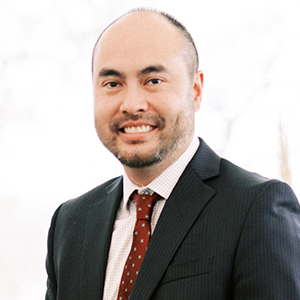 The industry event anyone in secured finance attends now celebrates its 77th year. SFNet is set to make the Arizona convention a memorable one. Click below to register.
The industry event anyone in secured finance attends now celebrates its 77th year. SFNet is set to make the Arizona convention a memorable one. Click below to register.

Hai T. Nguyen
Executive Director, Asset Based Lending, JPMorgan Chase & Co.
40 Under 40 Category: Portfolio/Risk Management
Hai Nguyen has been providing ABL financing to middle-market, large corporate and sponsor-owned companies across multiple industries for over 17 years. In his current role as executive director and ABL credit risk manager at J.P. Morgan, he is responsible for the portfolio management of retail, consumer and general industries clients and the structuring, underwriting and execution of a broad range of large corporate and sponsor-syndicated ABL transactions.
Since joining JPM in 2016, Hai has been a key contributor to several project teams that improved existing processes, including how letters of credit are managed and how middle office credit functions. He is also involved in credit analyst training and talent development. Prior to JPM, Hai was at GE Capital for 12 years in ABL and cash flow credit risk for the Corporate Lending and Sponsor Finance businesses.
Hai graduated summa cum laude with a BS in finance from Fairfield University and received an MBA from the Stern School of Business at NYU. Previously based in NY, Hai and his family relocated to Houston, TX in 2019.
Did you change the way you approach work while working remotely during the pandemic? Have these habits stayed with you as we emerge from the crisis?
At the start of the pandemic, my wife and I had to pivot and somehow manage to work long hours form home, with two kids under two years old and no childcare, which presented a great challenge since both of us have very demanding jobs. Like most families with young kids, we had to make it work by managing our time, scheduling important meetings around naps and meals and each other’s meeting schedules, or just took important calls as they came up with screaming kids in the background. We eventually were able to get help, but the lines between working from home and living at work quickly blurred. Some of the important changes and habits I will take from the last 15+ months of working from home include better time management and proposing shorter, more focused meetings (try 15-or-45 minute calls versus 30 or 60 minutes), sending out agendas and talking points before a call, turning off my messenger and trying to focus on one task to completion versus multi-tasking or task switching. The latter was a very important thing I learned early on – by trying to do too many things at once, I ended up taking longer to complete tasks, missed important details and become even more inefficient. Probably the most important habit I will carry forward, which one of my mentors advised me to do, is to really set boundaries between home life and work life and take care of my mental health. Unless the house is burning down, there is always tomorrow!
What advice do you normally give to the junior talent you mentor?
I’ve had the privilege of working with incredibly intelligent and eager junior talent and have taken tremendous pride in contributing to their development, most recently contributing to the Credit Fundamentals Training program, serving as a panelist, guest grader and mentor to new hires within the JPM credit risk organization. The one message I have always told them is to stay curious and always ask questions – there is no such thing as a stupid question and you will never find out the answer if you don’t ask. Nobody expects you to know everything Day 1, so use that to your advantage to ask as many questions as possible and leverage the combined experience of those around you. This is something my managers instilled in me early on, and it has stuck with me ever since. I’ve worked with best-in-class credit professionals throughout my career and continue to learn something new every day. I have always made a point to ask many questions and soak in all of the knowledge and expertise as best as I could, and I encourage those starting out in the industry to do the same.
What advice would you give on how to self-advocate?
Self-advocating does not come naturally to me, and I also hate talking about myself or accepting praise. Luckily, I’ve had some remarkable managers and mentors who have taken a keen interest in my career development and growth. The one common thing these managers and mentors have told me is that there is no better person to promote yourself than you and that nobody else will do it for you unless you do it for yourself first. If you make the effort to self-promote, it makes it much easier for those who have a vested interest in you to help you, whether it be a promotion, your next role, or receiving additional opportunities. Help others by helping yourself first.
77th Annual Convention
 The industry event anyone in secured finance attends now celebrates its 77th year. SFNet is set to make the Arizona convention a memorable one. Click below to register.
The industry event anyone in secured finance attends now celebrates its 77th year. SFNet is set to make the Arizona convention a memorable one. Click below to register.
